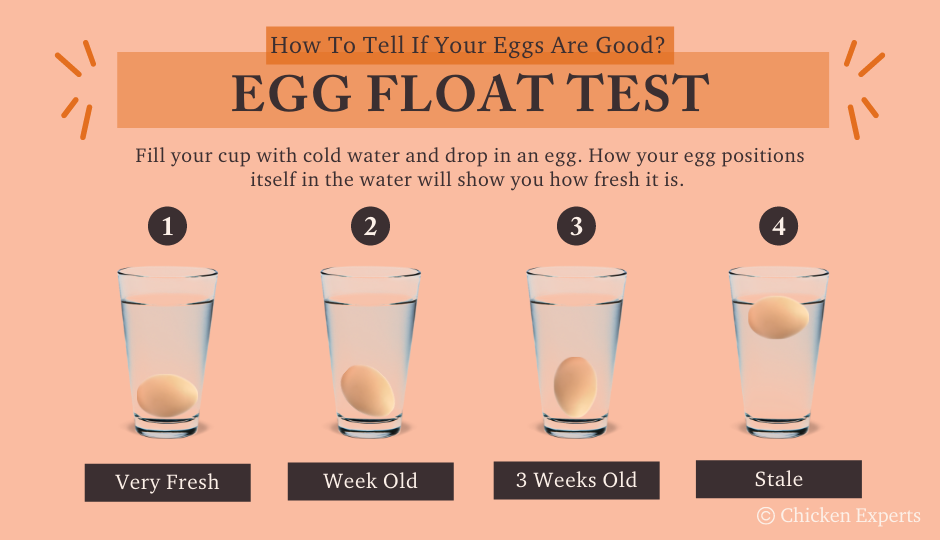

Want to know how to tell if your eggs are fresh? 🥚 We will tell you the most popular and reliable ways to check the fressness of your eggs as well as answer your FAQ’s and share our top tips for egg storage! So, let's get cracking!
Whether you brought them in from the coop or brought them from the store, there are 3 simple ways to tell if an egg is fresh and safe to eat:
- Egg float test (hot link to this title)
- Egg white test (hot link to this title)
- Egg sniff test (hot link to this title)
If you are short on time, we have made this quick little video to show you exactly how to complete an Egg Float Test!
Egg float test
A commonly used test to find out how fresh your eggs are is the float test. All you need is a glass big enough for your egg to go in and some water. It’s a popular way to test freshness as it accurately gives an indicator of how fresh your eggs are on a spectrum rather than a yes or no answer.
Fill your cup with cold water💧and drop in an egg. How your egg positions itself in the water will show you how fresh it is.
- A very fresh egg will sink to the bottom and lay horizontal.
- A week old egg will sink to the bottom with the larger end tilted up slightly.
- A three week old egg (still usable) will sink to the bottom and stand up on its point.
- A stale egg will float to the top of the surface of the water and needs to be thrown away.
Simple, right? Thanks to the growing air sack that eggs have between the shell and the internal thin membrane, the age of our eggs can be identified without even cracking them! The older the egg, the bigger the air sack and the more buoyant the egg is.

Egg white test
Another easy way to check the freshness of an egg is to crack it open and see what’s inside.
Simply, crack your egg on a flat plate and look closely.
- A fresh egg will have a yolk sitting high in the middle of the plate with the thick white sitting close to the yolk that is mostly intact.
- A stale egg will have a flat yolk and a runny white. If there are black or green spots, your eggs are moldy and need to be thrown away.
Egg sniff test
This is an immediate way to test for freshness. I’m sure you’ve heard the term “rotten eggs” when there is a sulfur smell around. Eggs actually emit that smell when they are way past their prime. You may even smell it through the shell.
If you’re not sure, just crack the egg into a bowl to sniff. Just like with milk, you’ll be able to tell it is off if it smells awful. That smell is the bacteria already in the egg.
Fresh egg test
It should go without saying but if your eggs fail any of these tests, they need to be thrown out. The risk of illness from a spoiled egg is a big possibility with the main risk being Salmonella which can cause diarrhea, vomiting🤮 and a fever. It’s always worth checking your eggs if you aren’t sure how fresh they are.
It may feel like a waste of an egg but not all of it has to be wasted! Eggshells are great for composting and making sidewalk chalk. If your eggs are shop bought, those cardboard cartons come in handy for art projects!
Keeping eggs fresh
Storing eggs in a carton in the refrigerator is the best way to ensure your eggs keep fresh for longer. The packaging used in grocery stores helps keep out odors and flavors from other foods in the fridge and protects those precious eggs from breaking. Even though most fridges come with those built in egg holders (usually in the door), they aren’t the best way to keep your eggs fresh.
If you do keep your eggs in a different carton to the one they came in, or your own chickens lay eggs, make sure to keep those eggs upright so that the pointier end is at the top. Since the yolk is more likely to spoil than the white, this position helps keep air cells at the top and reduces the chance of harmful bacteria reaching the yolk.
When not to eat the egg
Without the tests above, there are clear indications of what eggs you should and should not eat. Have you ever seen people at the grocery store open up an egg container to check for cracked eggs? It’s not just because of the mess. Bacteria can enter through the cracks in the shell and it’s hard to know how long that egg has been exposed for. The same goes for dents in the shell as it’s protective membrane is most likely broken.
You might wonder if cooking these eggs will kill off the bacteria, making them okay to eat. The answer is hell no! Exposure to air will cause the egg's defenses to fall to a host of bacteria which may not be affected by heat. Don't risk it!
If an egg cracks on the way home or if you accidentally cracked it when taking it out of the coop, you can break it into an airtight container, refrigerate and use within two days.
How long do eggs last?
With proper storage, fresh eggs (unwashed) can last for up to 6 months in the fridge.However, if they are shop bought, you’ll want to use one of the fresh tests to check out how old they actually are.
If you want them to last even longer, the best option is to freeze them. Freezing eggs does reduce their freshness so I’d recommend only using them for baking or as an ingredient in a recipe. To freeze eggs just crack them, beat them, and pour the mixture into a large ice cube tray. For separate yolks and whites, you can do the same thing which makes it super convenient for so many recipes.
FAQ:
- How long do eggs last in the fridge? Unwashed eggs can last up to 6 months in the fridge. If your eggs are shop bought, you may want to check the use by date and test eggs that you’ve had for more than three weeks.
- How can you tell if an egg is bad? It’s pretty obvious if an egg is off once you’ve cracked it. The yolk is often flatter and discolored, the white will be runnier than expected and if you smell something nasty, that’s a clear sign you don’t want to eat that egg!
- What is the best way to store eggs? In order to keep your eggs fresh for as long as possible, keep them in a cardboard carton and store them on the middle shelf of your fridge.
- What makes an egg off? Like with all fresh produce, eggs will eventually go bad. It starts to decompose because of bacteria and mould as the air pocket inside gets bigger and the white gets thinner.
Healthy hens produce healthy eggs! Therefore, it's essential that you've got the right knowledge you need to raise happy, healthy chooks. Did you know 67% of chicken keepers surveyed experienced a chicken health or behavior issue in the first 12 months that they didn’t know how to handle?
But don’t worry! Our feathered friends over at Chickenpedia have created a Chicken Healthcare Course, with dedicated sections on eggs, egg production, quality and care.
It is a comprehensive online course that includes everything you need, including what to look for in an unhealthy chicken and how to support your egg-laying hens to optimal health.
All of their courses are really well structured and filled with vital information, which is why we highly recommend them to all of our readers! Check out Chickenpedia today. As a member, you will also get access to ALL of their chicken courses!











Leave a comment (all fields required)